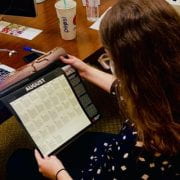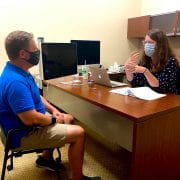Writer’s block. Procrastination. Deadline-induced-panic.
Call it what you will, but it all boils down to the same thing: you need to write, and you can’t.
I’ve written three major academic works over the last several years: an honors thesis, a master’s thesis, and a doctoral dissertation. Across these three projects, the number of accumulated hours I have spent staring at a cursor blinking on a blank screen, avoiding writing by scrolling Twitter or furiously cleaning my house, and coming up with reasons for my advisor that I did actually accomplish a great deal even though I wrote nothing…well, I probably could have written a few more dissertations in all that time.
Over the years, I’ve tried many different tactics and tips to help me write. Some weren’t for me, but others worked really well. Many I used consistently with great success (I did, eventually, finish my dissertation). I’ve compiled these tips for you here. Try a few out. See what works for you. Some tactics will work better for you than others. If you’re consistently struggling to write, it’s time to make a change!
Pomodoro Technique
How to do it: Set a timer for 25 minutes of work. Once the timer goes off, take a five-minute break. After 3-4 sessions of work, take a longer 20-30 minute break. There are also many apps you can download that will automate this; the apps allow you to change the length of the working sessions and breaks, as well as the number of sessions before a long break. I used the Focus Keeper app.
Why it works: For me, 25 minutes was a very achievable amount of time to consistently work. It helped stop me from mindlessly opening Twitter. If I could make it to the timer going off, I was rewarded with a break I didn’t feel guilty about! This technique also works well if you set specific tasks for yourself for each 25-minute session. Work on that task until the timer goes off! Of all the tips here, this is the #1 tip that helped me the most while writing my dissertation. Learn more about the Pomodoro Technique here.
Hand write
How to do it: Instead of typing on a laptop or tablet, get out some old-fashioned notebook paper and hand write.
Why it works: I often get trapped in a cycle of editing-as-I-go, meaning I type out a sentence and then spend 20 minutes reworking it to make it perfect. When I hand write, I don’t have that same urge (or ability!) to go back and make revisions immediately. I just write the words that immediately come to mind, rather than obsessing over how to word it correctly. Edit later!

Start in the middle
How to do it: Skip over the Introduction section or even an introductory paragraph. Jump straight to the part you feel most comfortable with.
Why it works: Introductions can often be the hardest bit to write. How do you set your reader up for what they’re about to read….when you haven’t written what they’re about to read yet? I often found that there were other sections I was more ready to write. Similarly, the first chapter I wrote of my dissertation ended up as Chapter 3 in the final version. I started with that topic because I knew the most about it.
A variation of this tip: skip over the tricky parts. If there’s something you’re having trouble getting on the page, write a placeholder sentence (Something like, COME BACK HERE TO TALK ABOUT SUCH AND SUCH) and move on. This help keeps you from getting bogged down!
 Write something bad
Write something bad
How to do it: Similar to hand writing, don’t let yourself edit. Don’t reread anything you’ve written. Don’t stop. Just keep writing!
Why it works: My advisor used to tell me “You can’t edit a blank page.” It’s better to write bad work because at least you have something to work with later. Don’t feel bad if you know what you’re writing is bad. That’s why there’s an editing stage! I sometimes approach this like stream of consciousness – just write what pops into my mind rather than trying to finesse it first.
 Keep a calendar
Keep a calendar
How to do it: Print a physical monthly calendar. At the end of each day you work on your project, write in that day’s square what you accomplished: how many words you wrote, how many pages you read, how many paragraphs you edited, etc.
Why it works: This has a similar energy to writing things on your to-do list you’ve already done, just so you can cross them out. But in all seriousness, tracking what I did accomplish helped me feel better about my progress, even when that progress was slow. Sometimes I wrote just 100 words, but I’d put that on my calendar. Then the next day, I’d try to write at least 200 words. And before I knew it, I was making real progress.
Talk it out
How to do it: Discuss the content of the section you’re working on with a friend. Explain to them what you are wanting to say in this section.
Why it works: When we are explaining something to a friend, we naturally provide the important context and background information that the friend needs to know to understand what we’re doing. Saying it all out loud can help things “click” into place for when you go back to write it. When I was writing my honors thesis, I shared my introduction with a friend who was an English graduate student. After reading it, she asked me to just tell her what my project was about. She then told me that what I’d told her sounded really interesting, but my current introduction did not say the same thing. When writing it out, I really struggled to put into words what I was wanting to explain to the reader. But talking it out loud was much easier! I then rewrote my introduction based on what I had explained to my friend.
 Take a break
Take a break
How to do it: Get up from your work station and take an actual break. Walk around the block. Run to Sonic Happy Hour. Play with your dog.
Why it works: If you’re like me, I take lots of “breaks” while I’m writing. I scroll TikTok. I rummage around for a snack. I fold some laundry. But these aren’t actual breaks – they’re just distractions and means to procrastinate. Take a real break, one you won’t feel guilty about and one that gets you up and away from your work area. Come back refreshed and ready to write!
Ask for help
How to do it: If you are struggling to know what to write, talk to your mentor. Ask for guidance on what sections a thesis in your discipline should include. Ask for tips on how to distill what you’ve already done – literature review, data analysis, etc. – into writing. If you are struggling with the quality of your writing, schedule an appointment with a UA Writing Consultant.
Why it works: Sometimes the issue is that we’re procrastinating. But sometimes the issue is that we simply don’t know what to do. You may have never written a paper like a thesis. That’s why you have a mentor, and that’s why the university has resources like the writing consultants. Use them! A writing consultant can be an incredible help to you, especially if you consult the same person consistently throughout the project. Why not get free help and produce a better product??
 Change location
Change location
How to do it: Pack up your laptop and books and go somewhere else to work. If you’re at home, go to the library or a coffee shop. If you’re in the library, try working at home.
Why it works: Some locations are just better suited for productivity than others. It’s important for you to figure out what works best for YOU. This might be a change you need to make consistently, or just a change of pace for the day. I never worked well at home. Too many distractions! I wrote most of my dissertation in my office in Gearhart. On Saturdays I’d hike from my parking spot with a bag full of books and a Route 44 Diet Coke, and churn out pages sitting at my desk. Sometimes I’d walk over to the library or the campus Starbucks. But my colleague, Dr. Katie Powell, wrote her dissertation in her home office! She says that she always worked better there than anywhere else. There’s no right answer, but if you’re struggling to be productive where you are, try changing it up.
 Start over
Start over
How to do it: Open a new file and start again.
Why it works: This is the hardest tip to implement. Often, we write something bad, but it can be fixed in the editing process. I think writing something bad is a great way to get started – see my tip above! But sometimes, we write something so bad that it can’t be rescued. This is usually because of big structural issues or problems with our argument, rather than grammatical or writing problems. When I met with my advisor after he read the first draft of the first chapter I wrote for my dissertation, he asked me, “Do you think this is good?” Sounds harsh, but he was nice about it! I ended up scrapping that entire thing – twenty pages – and starting over with a completely different approach and argument. It was a bitter pill at the time, but looking back, what I had written wasn’t salvageable. Instead of wasting time trying to fix it, it was best to start fresh.


